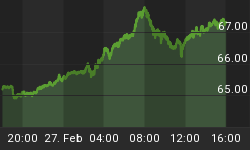Politics has long been a driver of international markets and fickle financial systems alike. Everything is connected. Here are some voices from the just-concluded Casey Research Fall Summit talking about cause, effect, and war.
James Rickards, senior managing director with Tangent Capital Partners and an audience favorite at investment conferences, says the Middle East, Russia, and China are all working against the US dollar and for gold.
America’s recently improved relationship with Iran is actually bad for the petrodollar, he claims, because the Saudis and the Iranians are bitter enemies. The Russians, for their part, aren’t sitting idly by while the US imposes sanctions on them—aside from Putin being able to freeze US assets in Russia, Rickards believes that Russian hackers may already have the ability to shut down the New York Stock Exchange.
China does want a strong dollar because it still holds over $1 trillion in dollar-denominated assets. But Beijing is aware that eventually the dollar will depreciate, so it’s buying gold to hedge against a decline in the value of the US currency. Current gold reserves are estimated to be between 3,000 and 4,000 tonnes of gold; the ultimate target may be 8,000 tonnes.
Rickards thinks that we are approaching a period of extreme volatility in the US markets and recommends allocating 10% of one’s portfolio to physical gold.
Bud Conrad, chief economist at Casey Research, also is a petrodollar bear. For the past 40 years, he says, the petrodollar has bestowed extraordinary privileges on Americans, but that era is now coming to an end.
Dozens of countries have already set up bilateral trade agreements that circumvent the US dollar. Dollars as a percentage of foreign reserves have declined from 55% in 1999 to 32% today—and could reach 18% by 2019, says Conrad. Ultimately, the petrodollar will fail, which will lead to a rise in sought-after commodities, especially gold.
Conrad thinks the greatest danger we face may be a combined financial and political collapse. Current geopolitical problems are even worse than economic problems, he says, and the trend is toward more, not less, war. Wars, on the other hand, often precipitate financial collapse.
Grant Williams, portfolio and strategy advisor for Vulpes Investment Management in Singapore and editor of the hugely popular newsletter Things That Make You Go Hmmm…, wholeheartedly agrees.
War and financial turmoil have always been inextricably linked, says Williams. Both occur in natural cycles, and one often causes the other. He believes that we’re in an extended period of economic peace because the Federal Reserve has used monetary policy “to abolish the bottom half of the business cycle.â€
Although that may sound like a good thing, it is not. The business cycle, argues Williams, is inevitable and natural; we need it to cleanse the economy. But the Fed has leveraged to such unsustainable levels to “keep the peace†that the inevitable fallout will be that much worse.
He foresees serious wars to accompany the coming financial turmoil. Today’s geopolitical setup, he says, is similar to 1914’s. In 1914, France was a fading former giant (that’s Japan today); Britain was a waning superpower, no longer able to guarantee global security (that’s the US now); and Germany was an emerging industrial power huffing and puffing and making territorial claims (today, that’s China).
Rather than all-out war, Marin Katusa, Casey’s chief energy investment strategist, believes the new “Colder War†will be fought by economic means, specifically through domination of the energy markets.
While Europe is using less oil than it did over a decade ago, says Katusa, it’s depending more on Russia for its energy. North Sea oil and gas production is in decline, and Norway’s production has reached a plateau and is dropping. Russia, on the other hand, owns 40% of the world’s conventional oil and gas reserves.
The solution, Katusa says, is the “European Energy Renaissance.†As Putin tightens the thumbscrews on his energy trading partners, more and more EU countries are waking up to the fact that they will have to produce their own energy to gain independence from Russia. As the best ways to play this new paradigm, Katusa recommends three undervalued North American companies that are in the thick of the action.
To get Marin Katusa’s timely stock picks (and those of the other speakers), as well as every single presentation of the Summit and all bonus files the speakers used, order your 26+-hour Summit Audio Collection now. They’re available in CD and/or MP3 format. Learn more here.
The article War, Peace, and Financial Fireworks was originally published at caseyresearch.com















